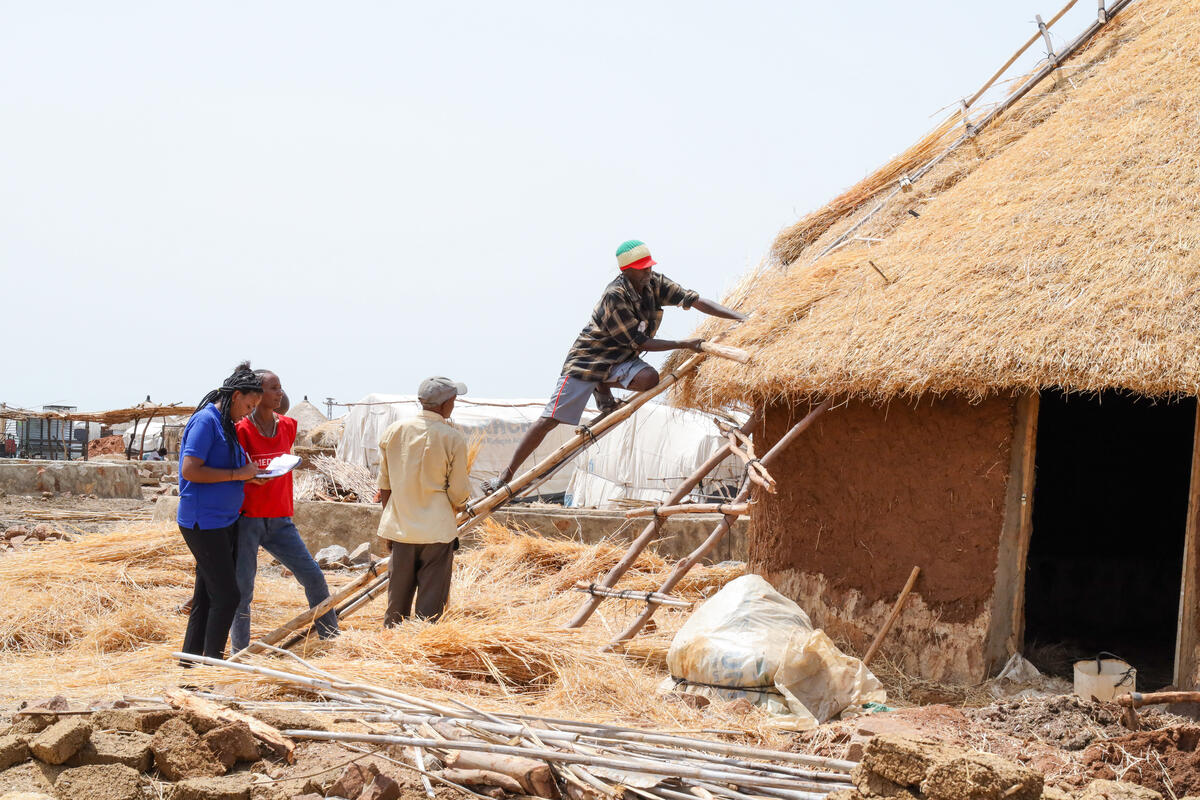UNHCR shelter kits reach more than a million Afghan returnees
UNHCR shelter kits reach more than a million Afghan returnees

CHURCHURAK, Afghanistan, January 16 (UNHCR) - More than one million people have benefited from the UN refugee agency's shelter project in Afghanistan, alleviating a pressing need for one of the most vulnerable groups in the war-torn country.
The project was launched in 2002 to assist some of the millions of displaced Afghans flocking home. Some 160,000 returnee and internally displaced families, or more than one million people, have since received help to build their homes.
Only the most vulnerable returnee families qualify for shelter assistance after their needs are assessed by government officials and UNHCR staff. Those selected must build the walls of their homes before receiving timber for the roof, and frames for the doors and windows. They also get cash ranging from US$50-US$100 to support them in the building process.
Valued at more than US$100 million, the shelter project has brought tangible changes to the lives of needy Afghans who had to restart their lives after decades of exile in Pakistan and Iran.
"No one can understand the problems of a homeless person, particularly in the cold winter of Afghanistan, unless he lives in a similar condition," said Mohammad Agha, 47, who returned with his family of 10 last year after spending 18 years in Pakistan.
Their home village of Churchurak, a slum area outside the Parwan provincial capital of Charikar, was a battleground between the Taliban and the former Northern Alliance in the late 1990s. Depopulated by the fighting, the village north of Kabul is changing its face as inhabitants rebuild their houses and gardens.
Mohammad Agha received shelter assistance from UNHCR last year. "Now I have no worry as I have built my house and am living an honourable life," he said, adding that having his own home enabled him to enjoy the recent Eid ul Adha Islamic holiday with his family, relatives and friends.
Shelter is the first concern of returnees, acknowledged Austad Mohammad Akbar Akbar, the Afghan Minister for Refugees and Repatriation. He said the government was determined to tackle the problem and added that he pays particular attention to landless returnees.
"The government land allocation scheme offers potential to assist landless returnees who so far have not been able to rebuild their lives in Afghanistan," said the minister. More than 30,000 plots have been distributed to returnees in 29 of the country's 34 provinces.
Not far from Churchurak village, a group of nearly 150 families have recently received plots of government land after living in makeshift shelters in the poor areas of Kabul. Everyone is busy building their houses, but shelter is only one of their many needs.
Among them is returnee Jan Agha, who lost his leg during the conflict in 1993. He said he was very happy to start a new life at home, but complained that as a cripple with no regular income, he could not juggle between building his house, supporting his family and sending his children to school.
His daughter Mughgan, 11, said she hoped to be enrolled in school next year so she can study to become a teacher. "I am satisfied with the development but I wish a school could be built as early as next year close to our home so that I don't miss my next year of education," she said.
Jan Agha added, "We need schools, clinics, mosques and more facilities, including the construction of streets to connect our village to the main road."
Other returnees bemoaned the lack of jobs back home. "Improving living conditions in Afghanistan will take time as the reconstruction process is slow and finding a job is difficult," said one.
Hashmat Khan, who returned from Pakistan two years ago, said that in exile "it was easy to earn enough money daily and properly feed my children. But I have not had a regular job since I came home."
While the UN refugee agency will continue to meet the pressing shelter needs of vulnerable returnees - it plans to provide some 10,000 shelter units countrywide this year - much more needs to be done with the support of the government and donor countries to promote longer-term rehabilitation and development in Afghanistan, allowing its diaspora to come home for good.
More than 3.7 million Afghans have returned home with UNHCR assistance since 2002. Another half million Afghans displaced within the country have also been assisted to return to their areas of origin.
By Mohammed Nader Farhad in Churchurak, Afghanistan









